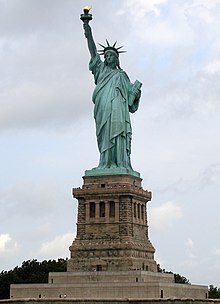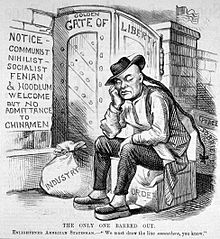U. S. Government/Immigrants

Rapid industrialization1 and urbanization2 led to overcrowded immigrant neighborhoods and tenements3.
Immigrants
[edit | edit source]Reasons for increased immigration
[edit | edit source]- Hope for better opportunities
- Religious freedom
- Escape from oppressive4 governments
- Adventure
Challenges faced by cities due to immigration
[edit | edit source]- Tenements5 (poorly built/overcrowded housing where many immigrants lived), and Ghettos (places of high concentration of any minority).
- Political corruption (such as political machines which were organizations that used legal and illegal methods to ensure that their candidates won elections).
Efforts to help Immigrants
[edit | edit source]- Settlement houses6 such as Hull House7, founded by Jane Addams8, were neighborhood centers that arose in the late 1800s to offer education, recreation, and social activities to immigrants and poor people. [NOTE: IMMIGRANTS DID NOT LIVE IN HULL HOUSES]
- Political machines9 that gained power by attending to the needs of new immigrants (e.g., jobs, housing). Often used illegal methods to gain power... But still offered jobs or better living conditions to immigrants in exchange for votes.
Efforts to Solve the Immigrant Problem
[edit | edit source]Immigrants faced political corruption
[edit | edit source]
Political Machines were organizations that used legal and illegal methods to ensure that their candidates won elections. Once in power, they stole money from the city. Because of this, cities often did not have money for law enforcement (crime rose), sanitation (pollution spread), and medical care (disease spread). Leaders of the political machines became known as bosses. An example of a famous "boss", was William "Boss" Tweed10.
Problem specific immigrant groups faced
[edit | edit source]
Chinese - due to the differences in language and custom, Congress passed the Chinese Exclusion Act, which banned Chinese people from immigrating to the U.S. for 10 years.
Irish and other European Immigrants - Many immigrants were thought to be denser to society due to their lack of education and poverty (being poor).
